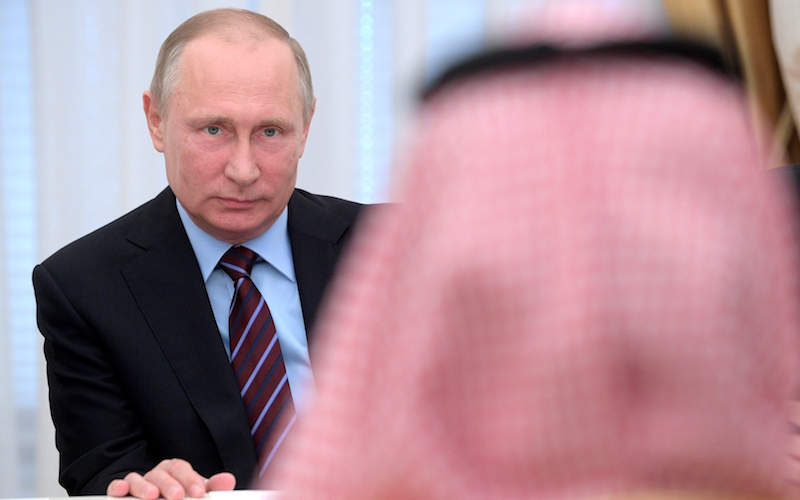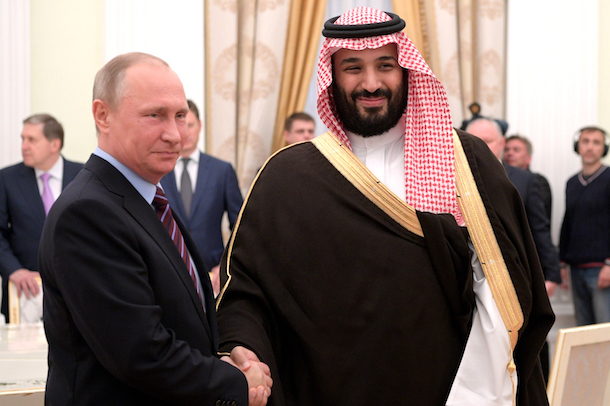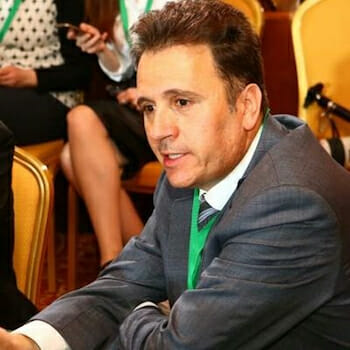
Saudi Arabia: Between Moscow and Washington
On the heels of US President Donald Trump’s historic visit to Riyadh, where he signed deals worth hundreds of billions of dollars for American firms mainly in the defense sector, Saudi Arabia’s Deputy Crown Prince and Defense Minister, Mohamed bin Salman (MbS), visited Moscow today. There are also expectations that Russian President Vladimir Putin will visit Kuwait and Qatar during late June.
Topics on MbS’ agenda in Russia were the Arab world’s raging civil wars, Saudi-Iranian relations, and the prospects for Riyadh and Moscow deepening cooperation in the counter-terrorism sphere. His focus on oil and inter-faith dialogue after the formation of the anti-terrorist center in Riyadh which will require more cooperation between a growing number of governments in terms of sharing intelligence in order to prove successful.
MbS argued for building a new foundation between Riyadh and Moscow concerning energy issues in line with agreements reached on OPEC and non-OPEC oil policies in September on the sidelines of the G20 in China that ushered in a new era of Saudi-Russian relations. The Deputy Crown Prince, in doing so, used language that was remarkably similar to that which he used at the Pentagon back in March when he was the first GCC royal to visit Washington since Trump’s presidency began.
MbS said after meeting Putin, “The relations between Saudi Arabia and Russia are going through one of their best moments ever. We have a lot of common grounds. As far as our disagreements are concerned, we have a clear mechanism of how to overcome them. We are moving forward quickly and in a positive way.” In turn, Putin asserted “We are grateful to you for your ideas and the joint work between OPEC and the countries, which are not part of the cartel. We support political contacts, contacts between defense ministries, we work together on sorting difficult situation, including in Syria.” Such mutual accolades signal a positive step forward in Kingdom-Kremlin relations during a time of upheaval across the region.
Russia’s increasingly powerful role in Middle Eastern affairs was underscored in January 2016 by the Emir of Qatar’s trip to Moscow. Emir Tamim sought Putin’s assistance in rescuing 26 Qataris kidnapped in southern Iraq, including members of the royal family. After the Russians in coordination with Iran managed to rescue the kidnapped through a long process of negotiations with the kidnappers, Qatar started rethinking its position and stand regarding the Syria crisis. This became clear once Al Jazeera’s coverage of Syria included language about the Syrian Arab Army (SAA), rather than “Bashar’s army.” Arguably, this was an outcome stepped up Iranian and Russia pressure on Doha.
Putin’s forthcoming visit to two Gulf Cooperation Council (GCC) states will mainly focus on energy, investment, infrastructure, weapons deals, and counter-terrorism. The Russian leader’s visit to Qatar at this time is significant given ongoing tensions between the emirate and other Arab governments due to Doha’s alleged support for terrorism and rather cordial ties with the Islamic Republic. Along with some of their counterparts in Western governments, officials in other GCC states, Egypt, Iran, Iraq, and Syria accuse Doha of sponsoring militant Sunni fundamentalist forces across the tumultuous Arab world and providing a base for the Muslim Brotherhood in the Arabian Gulf. Kuwait, which maintains a rather dovish foreign policy, enjoys somewhat normalized ties with Iran and an extremely close alliance with Saudi Arabia. The Kuwaitis recognize that the Kremlin has a potentially key role to play in improving relations between Riyadh and Tehran, as well as promoting better ties between Qatar and other Middle Eastern countries.
Simultaneously, as the Saudis remain embroiled in an unwinnable war in Yemen, oil prices stay low, and the Kingdom’s oil reserves drain, US support remains important. From Riyadh’s viewpoint, Trump’s visit to the Kingdom was a success in terms of crediting MbS during this period of time that is challenging for Saudi Arabia, its National Transformation Program and the ultimate goals of success dictated by Vision 2030.

In Riyadh, Trump met with the heads of the Saudi royal family, and the heads of 55 other Arab/Muslim countries in an attempt to form a new anti-terrorist and military alliance to curb Iran’s influence in the region. The alliance ― under the US guidance ― is expected to serve the role as the ‘Arab NATO,’ as Trump seeks to deliver on his campaign promises ― to make the allies pay for their own security. Clearly, the latest of Trump’s deals is indeed making the Saudis pay dearly. Whether the ‘Arab NATO’ alliance will provide the security it promises remains to be seen.
Many are legitimately fearful of the Middle East’s wars escalating, as expressed by voices at the Arab Islamic American Summit who point their fingers at Iran, accusing the Islamic Republic of being the world’s primary state sponsor of terrorism and root cause of the Arab world’s instability and unrest.
Ultimately, MbS was behind the major arms deal between the United States and Saudi Arabia and the Deputy Crown Prince is the Kingdom’s key spokesperson against the Islamic Republic as illustrated by his interview earlier this month with Dawood Al Shirian in which the Deputy Crown Prince threatened Iran and dismissed the idea of negotiating with Tehran. Iranian officials, including the Foreign Minister Mohammad Javad Zarif and the re-elected president Hassan Rouhani, on the other hand, have called for closer collaboration with the GCC states in economic and security spheres. While urging the western countries to stop meddling in the Middle Eastern affairs, Zarif and Rouhani have spoken about creating a ‘Sea of Friendship’ based on better GCC-Tehran relations. Following the Arab Islamic American Summit, Russian officials declined to comment on the arms deal, stating that US-Saudi relations are the business of the two countries and that Russian-Saudi relations are a separate matter.
Last month, a high level Russian delegation headed by the Chairman of the Federation Council Valentina Matviyenko visited Riyadh to discuss bolstering international joint efforts in the fight against terrorism. According to media reports, the Russians were satisfied with the meeting despite disagreement over Syria.
MbS’ visit to Moscow is notable in the terms of pushing counter-terrorism cooperation. In the context of Russian-Saudi relations, MBS’ visit is a response to the aforementioned visit by the Matviyenko delegation to Riyadh last month, which was aimed at finding more common ground with Saudis when it comes to countering terrorist forces not only in the Middle East but in all corners of the globe. But odds are good that Iran remains an obstacle between officials in Riyadh and Moscow who have opposing views of Tehran’s role in the struggle against militant Salafist-Jihadist fighters in Iraq and Syria.
Of much symbolic significance, the Russian delegation’s visit to Riyadh last month took place during the Great Lent, just before Easter, while the Saudi delegation is visiting Moscow today during the Ramadan fast (its Muslim equivalent) and officials from both countries will discuss inter-faith dialogue.
The Saudis are asking Russia to concede some level of support for Iran in exchange for more Saudi investments in diverse sectors of Russia’s economy. But the likelihood of Moscow abandoning Tehran at this moment, or anytime soon, is a pipe dream. From the Kremlin’s perspective, the most ideal scenario in the Gulf would involve Moscow fostering an improved relationship between Saudi Arabia and Iran.
Following the Arab Islamic American Summit an important yet underreported meeting of high-level security officials was held in Zavidovo, in Russia. Of special importance is the quadripartite meeting of Russian, Iranian, Iraqi, and Syrian heads of security and intelligence services, Nikolai Patrushev, Ali Shamkhani, Faleh Fayyad, and Ali Mamlook. They met to discuss scenarios and responses to the US-Saudi initiative and regional security.
Just weeks before Iran’s presidential elections, Russian Foreign Minister Sergei Lavrov announced that Russia is ready to accept Iran’s accession to the Shanghai Cooperation Organization, following the lifting of sanctions on Tehran. As a key state in the control of the crucial Indian Ocean choke point of Strait of Hormuz, Iran is immensely valuable to Russia and China regarding military/security and economic affairs and their futures. Beijing’s ambitious “One Belt, One Road” project is set to deepen Sino-Iranian economic cooperation in the years to come. Moreover, Moscow recently announced its plan to create a temporary free trade zone between the Eurasian Economic Union and Iran as a prelude to a permanent free trade zone.
Why does MbS, if so confident about the ‘Arab NATO’ alliance’s success and the recent arms deal with Washington (the largest in history), need Russian support for the Kingdom? Could it be that something else is happening behind the scenes? Although the Saudi media spared no effort to present the Arab Islamic American Summit as a great success, the fact remains that not all Arab states are in symphony regarding the goals of the announced alliance.
Egypt, for one, has stated that it does not support the ‘Arab NATO’ fighting in Syria where Cairo supports the Damascus regime, underscored by reporting on Egypt’s military presence in the country to support SAA forces. Arab officials in numerous governments are accusing Qatar of sponsoring scores of terrorist groups/individuals all over the Middle East, including al-Qaeda affiliates in Iraq and Syria. This month Bahrain, Egypt, Saudi Arabia, and the UAE blocked access to Al Jazeera and other Qatari media platforms, a move which Qatar decried as unjust.
Although the Arab Islamic American Summit intended to demonstrate strong Saudi leadership in the Arab world, the outcomes of MbS’ deals with the US, Russia, and other regional and global powers and their impact on the Saudi economy will ultimately decide the Kingdom’s future trajectory. Russia is playing its role smoothly, acting not only as an intermediary between Saudi Arabia and Iran but also seeing an opportunity to deepen the Kremlin’s involvement in GCC affairs. The path on which the Saudi defense minister is betting on is going to be challenging and expose new alignments between Russia, the GCC states, and their neighbors.

